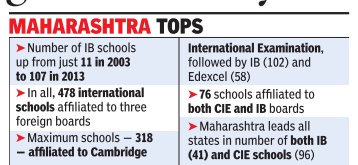International schools, International Baccalaureate (IB), India
(Created page with "{| Class="wikitable" |- |colspan="0"|<div style="font-size:100%"> This is a collection of articles archived for the excellence of their content.<br/> </div> |} [[Category:Ind...") |
Revision as of 02:52, 7 June 2015
This is a collection of articles archived for the excellence of their content. |
IB schools in India: 2003-2013
The Times of India, May 20 2015
IB schools in India post 10-fold growth in 10 yrS
Akshaya Mukul
India may not have the Ivy League but it is fast getting an `IB league'. According to a new report, the number of schools with IB (International Baccalaureate) has grown nearly ten-fold in the last 10 years. In 2003, just 11 schools offered the IB programme. By 2013, this had gone up to 107, with Maharashtra leading with 41 schools. It's not just IB; other international school programs have become more popular as well. The study conducted by the National University of Educational Planning & Administration said that as of 2013, there were 478 international schools affiliated to three foreign boards the Geneva-headquartered IB, Cambridge International Examination (CIE) and Edexcel, both based in the UK.
These are spread across 19 Indian states, with the highest number (318 schools) affiliated to CIE, followed by IB (102) and Edexcel (58). Seventy-six schools are affiliated to both CIE and IB. Maharashtra has the highest number of CIE schools as well at 96. One of the reasons for the growth of international schools has been the perception that they encourage creativity and free thinking, both important characteristics for success in a globalized world.Not surprisingly , the profile of the “international“ student has also changed. Earlier, the study notes, only children from expatriate families, business class and multinational professionals were going to international schools but now even middle class families are sending their children to these schools.
The study commissioned by the HRD ministry has suggested that the government initiate a policy framework for the establishment and regulation of international schools by setting up the In ternational Schools Regulatory Authority (ISRA).
The study has asked the government to clearly specify the essential attributes of an `international' school.For instance, more than 20% international mix of students and faculty could be one way of doing it.
